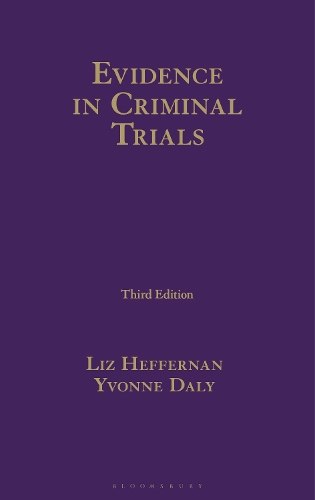
Evidence in Criminal Trials
(Hardback, 3rd edition)
Available Formats
Hardback, 2nd edition
Published: 16th October 2020
Hardback, 3rd edition
Published: 11th September 2025
Publishing Details
Evidence in Criminal Trials
By (Author) Liz Heffernan
By (author) Yvonne Daly
Bloomsbury Publishing PLC
Bloomsbury Professional
11th September 2025
3rd edition
United Kingdom
Classifications
Professional and Scholarly
Non Fiction
345.41706
Physical Properties
Hardback
1184
Width 156mm, Height 248mm
Description
Shortlisted for DSBA Law Book of the Year Award 2020
Evidence in Criminal Trials is the only Irish textbook devoted exclusively to the subject of criminal evidence. It provides extensive coverage of law and practice on the admissibility of evidence, the presentation of evidence in court and the pre-trial gathering and disclosure of evidence. The work combines analysis of traditional evidentiary doctrine with discussion of its application in practice and takes account of policy development and reform. The subject of evidence is discussed in the broader context of fundamental rights protection under the Constitution, the ECHR and EU law.
This updated and extended third edition captures the many significant changes in the law of criminal evidence in recent years, including in the areas of:
- Evidence generated through use of technology: eg CCTV, mobile phones, social media;
- Garda custody
- Vulnerable witnesses
Key legislation and cases examined include:
- DPP v JD [2022] IESC 39 (right to silence)
- DPP v Behan [2022] IESC 23 (search warrants)
- DPP v Hannaway [2021] IESC 31 (surveillance)
- DPP v Quirke [2023] IESC 5 and [2023] IESC 20 (computer evidence/unconstitutionally obtained evidence)
- DPP v McAreavey and Smyth [2022] IECA 182; DPP v Dwyer [2023] IECA 70 (mobile phone evidence)
- Criminal Procedure Act 2021 (introduction of preliminary hearings)
- Garda Sochna (Powers) Bill 2021 (right to legal representation during garda detention)
- Criminal Justice (Miscellaneous Provisions) Bill 2022 (anonymity of witnesses, certificate evidence)
- Garda Sochna (Recording Devices) Bill 2022 (bodycam evidence)
This book will appeal to individuals working and studying in the areas of criminal law and evidence. It will be essential reading for legal practitioners, academics and law students and it will be of interest to others engaged with criminal justice and the court system.
This title will be added to the Irish Criminal Law service on Bloomsbury Professional Online.
Author Bio
Liz Heffernan, LLB (Dublin), LLM (Dalhousie), LLM & JSD (Chicago), MEd (Dublin), BL, admitted New York & US Federal Bar, is an Associate Professor and Fellow at Trinity College Dublin. She currently teaches and supervises student research in the areas of Evidence and Criminal Law. Her publications include: Heffernan, Evidence in Criminal Trials (2nd ed, Bloomsbury Professional, 2020); Heffernan, Legal Professional Privilege (Bloomsbury Professional, 2011); Heffernan, Ryan and Imwinkelried, Evidentiary Foundations: Irish Edition (Bloomsbury Professional, 2008); and Heffernan, Scientific Evidence: Fingerprints and DNA (Bloomsbury Professional, 2006).
Yvonne Daly is Professor of Criminal Law and Evidence at Dublin City University and she has a specific research focus on effective criminal defence and the legal regulation of criminal investigations. Yvonne holds a BCL from University College Cork and a PhD from Trinity College Dublin, where her thesis was entitled Assembly Lines and Obstacle Courses: The Pre-Trial Process in Ireland. She engages in detailed doctrinal and comparative work across European and international jurisdictions, and empirical research which explores the law in action, as compared with the theory. Her research is grounded in fundamental human rights instruments, such as the Irish Constitution and the European Convention on Human Rights, and it has been published widely. She is a co-editor of Teaching Evidence Law: Contemporary Trends and Innovations (Routledge, 2020) and the Routledge Handbook of Irish Criminology (Routledge, 2016), a co-author of Irish Criminal Justice: Theory, Process and Procedure (Clarus Press, 2010) a former Board Member of the Association for Criminal Justice Research and Development (2015-2019), former vice-chair of the Ethical, Political, Legal and Philosophical Studies Committee of the Royal Irish Academy (2014-2018), and a current member of the Governing Authority of DCU. Yvonne and her colleague Dr Vicky Conway were central to the development of the bespoke SUPRALAT training programme for criminal defence practitioners attending police station interviews, which was developed, with colleagues across Europe, as part of an EU-funded project. They have delivered this training to over 100 criminal defence solicitors in Ireland in conjunction with the Law Society of Ireland and contributed to Garda training on the topic. The SUPRALAT training, and derivatives thereof, have also been delivered in Belgium, the Netherlands, and Scotland, and it has been further expanded and delivered under the EU-funded NETRPRALAT project in Spain, Lithuania and Poland.
